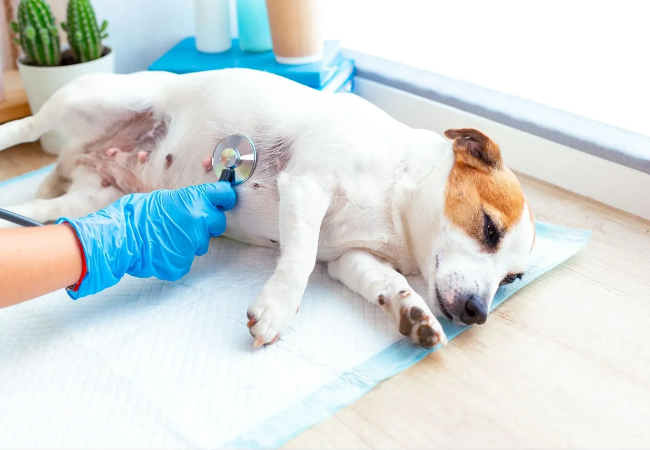Vet Guide to Chronic Gastritis in Dogs 2025 🐶🩺

In this article
Vet Guide to Chronic Gastritis in Dogs 2025 🐶🩺
By Dr. Duncan Houston BVSc
Chronic gastritis is long-term inflammation of the stomach lining, causing ongoing vomiting and discomfort. As a vet, I’ll walk you through causes, signs, diagnostics, treatment options, and management strategies that help your dog feel better and live well. 💊
🔍 What Is Chronic Gastritis?
Chronic gastritis refers to gastric inflammation lasting longer than 1–2 weeks, not explained by dietary indiscretion or acute causes. Common findings include intermittent vomiting—often of food or bile—and sometimes weight loss or mild systemic illness.
📍 Causes & Risk Factors
- Dietary Sensitivities: Food allergies, intolerances—even some hypoallergenic diets—for months.
- Infections: Helicobacter spp. or other chronic bacterial overgrowth.
- Immune-Mediated GI Disease: IBD or eosinophilic gastritis can drive ongoing inflammation.
- Systemic Disease: Conditions like pancreatitis, liver or kidney dysfunction, causing secondary gastritis.
- Neoplasia: Gastric tumors or lymphomas lead to persistent signs.
⚠️ Common Clinical Signs
- Intermittent vomiting of food, bile, or mucus, lasting weeks.
- Reduced appetite, occasional weight loss
- Mild lethargy, abdominal discomfort
- Rarely, black (“coffee grounds”) vomit or stools if ulceration is present.
🔬 How Vets Diagnose
- Blood & Urinalysis: To rule out systemic diseases—usually unremarkable.
- Fecal Screening: Tests for parasites or pathogens.
- Imaging: X‑rays or ultrasound reveal thickened stomach walls, masses, or obstructions.
- Endoscopy with Biopsy: Gold standard for diagnosis and histopathology.
- Diet Trial: Novel-protein trial before invasive diagnostics, as food-responsive gastritis is common.
💊 Treatment & Management
1. Dietary Adjustment
- Switch to a highly digestible, novel, or hydrolyzed-protein diet for 6–8 weeks.
2. Medications
- Antiemetics: Maropitant, ondansetron, metoclopramide reduce vomiting.
- Acid Control: Proton-pump inhibitors (omeprazole) or H2 blockers (famotidine) for ulceration.
- Protectants: Sucralfate to coat and heal the stomach lining.
- Immunosuppressives: Prednisone, cyclosporine in confirmed lymphocytic or eosinophilic types.
3. Supportive Care
- IV or subcutaneous fluids if dehydrated.
- Frequent small feedings, possibly via feeding tube when needed.
📈 Prognosis & Follow‑Up
- Food-responsive cases generally do well with diet change alone.
- Immune-mediated or ulcerative forms may require lifelong medications—monitor regularly.
- Serial checkups (6–12 weeks post-treatment) by ultrasound or blood work may be advised.
📊 Quick Reference Table
| Aspect | Findings | Action |
|---|---|---|
| History | Vomiting >2 weeks, diet change ineffective | Proceed to diagnostics |
| Diagnostics | Imaging, biopsy, labs | Identify the underlying disease |
| Treatment | Diet, meds, immunosuppression | Tailor to cause |
| Follow-up | Clinical improvement | Adjust long-term care |
✅ Vet Tips by Dr Duncan Houston BVSc
- Begin with a diet trial before invasive tests—easy and often resolves symptoms.
- Collect labs and imaging early to rule out serious conditions.
- Use biopsy to confirm diagnosis if clinical signs persist.
- Monitor clinical signs and hydration—adjust treatment as needed.
If your dog has chronic vomiting or appears uncomfortable, don’t wait—use the AskAVet.com app for an urgent vet chat. With correct care, most dogs with chronic gastritis can return to healthy, happy lives! 🐾❤️






